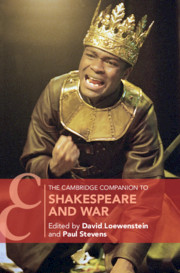Book contents
- The Cambridge Companion to Shakespeare and War
- The Cambridge Companion to Shakespeare and War
- Copyright page
- Dedication
- Contents
- Figures
- Contributors
- Preface
- Acknowledgments
- 1 Beyond Shallow and Silence
- 2 Just War Theory and Shakespeare
- 3 Shakespeare on Civil and Dynastic Wars
- 4 Foreign War
- 5 War and the Classical World
- 6 “The Question of These Wars”
- 7 Instrumentalizing Anger
- 8 War and Eros
- 9 Shakespeare’s Language and the Rhetoric of War
- 10 Staging Shakespeare’s Wars in the Twentieth and Twenty-First Centuries
- 11 Reading Shakespeare’s Wars on Film
- 12 Shakespeare and World War II
- 13 Henry V and the Pleasures of War
- 14 Macbeth and Trauma
- 15 Coriolanus and the Use of Power
- Index
- References
4 - Foreign War
Published online by Cambridge University Press: 17 August 2021
- The Cambridge Companion to Shakespeare and War
- The Cambridge Companion to Shakespeare and War
- Copyright page
- Dedication
- Contents
- Figures
- Contributors
- Preface
- Acknowledgments
- 1 Beyond Shallow and Silence
- 2 Just War Theory and Shakespeare
- 3 Shakespeare on Civil and Dynastic Wars
- 4 Foreign War
- 5 War and the Classical World
- 6 “The Question of These Wars”
- 7 Instrumentalizing Anger
- 8 War and Eros
- 9 Shakespeare’s Language and the Rhetoric of War
- 10 Staging Shakespeare’s Wars in the Twentieth and Twenty-First Centuries
- 11 Reading Shakespeare’s Wars on Film
- 12 Shakespeare and World War II
- 13 Henry V and the Pleasures of War
- 14 Macbeth and Trauma
- 15 Coriolanus and the Use of Power
- Index
- References
Summary
This chapter explores the scene of conflict with a foreign power in Shakespeare’s plays, particularly the history plays 1 Henry VI, King John, and Henry V, in which war with France provides the testing ground for an exploration of the contrast between foreign and native, or national, values. In these plays, Englishness is largely defined in terms of masculine stoicism and canny tactical knowledge, as opposed to French foppishness. The characterization of the English as providentially favored underdogs up against an overconfident enemy present in Henry V and King John recalls Elizabethan conflicts with Spain and the papacy. Gender identity also factors prominently in Shakespeare’s creation of a sense of the foreign, as he describes England’s island geography as a virginal national space to be defended against invasion. At the same time, Macbeth demonstrates that Shakespeare does not shy away from this conflict between foreign and native on the home front.
- Type
- Chapter
- Information
- The Cambridge Companion to Shakespeare and War , pp. 54 - 74Publisher: Cambridge University PressPrint publication year: 2021



